Top-TierFlat Roofs
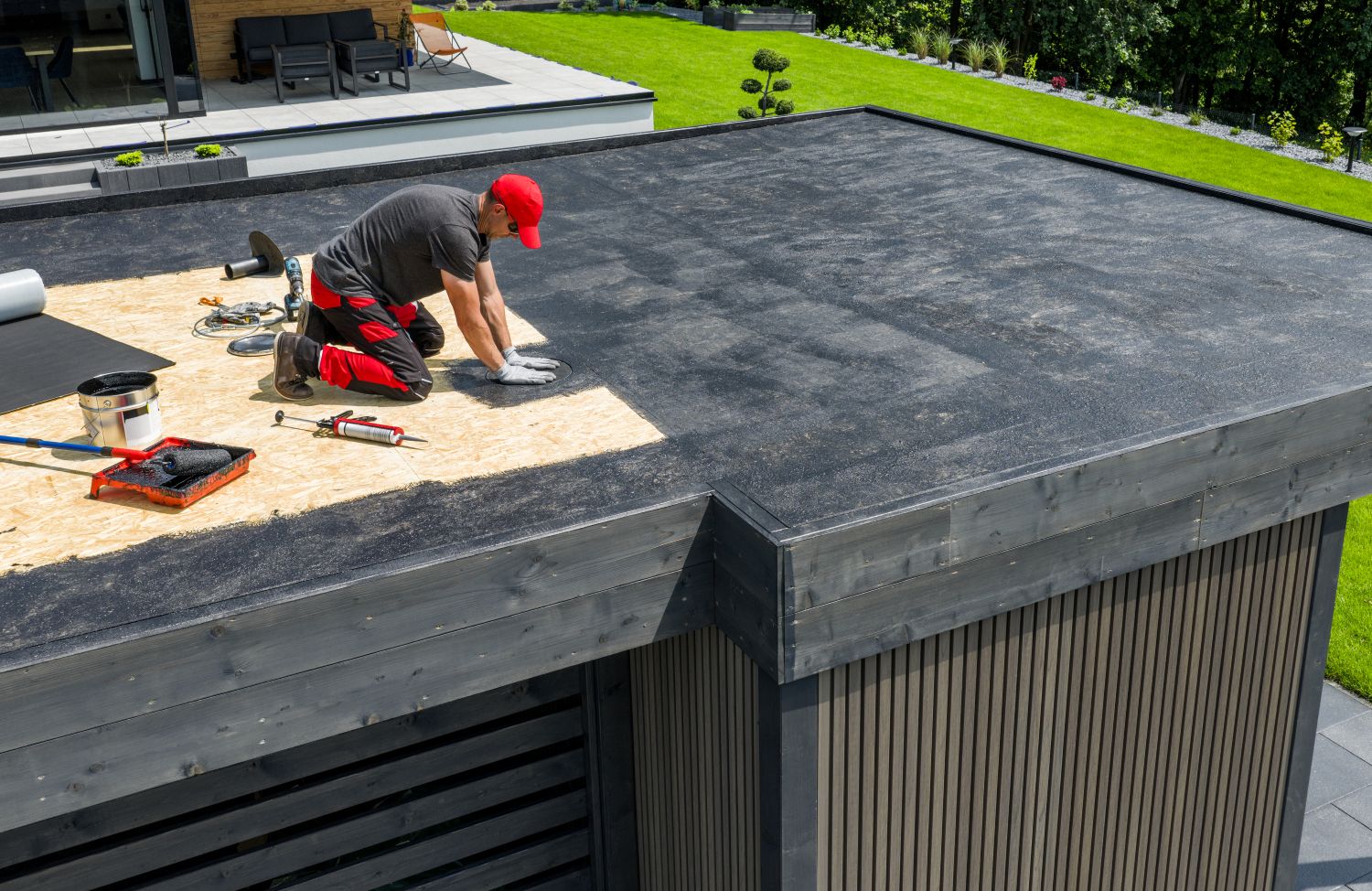
+1 805-225-7663
Why Flat Roofs Matter in Modern Construction
Why Choose Us for Flat Roof Installation?
When it comes to flat roof construction, precision is everything. Our crew specializes in low-slope roofing and flat roofing, bringing decades of hands-on experience and proven performance.
Here’s why we stand out:
Licensed and insured roofing contractors with flat roof expertise
Access to top-rated roof materials, including modified bitumen, EPDM, and PVC roofing
Solutions for both residential and commercial roofing needs
Free roof inspections and fast, affordable estimates
Warranties that protect your roof system long-term
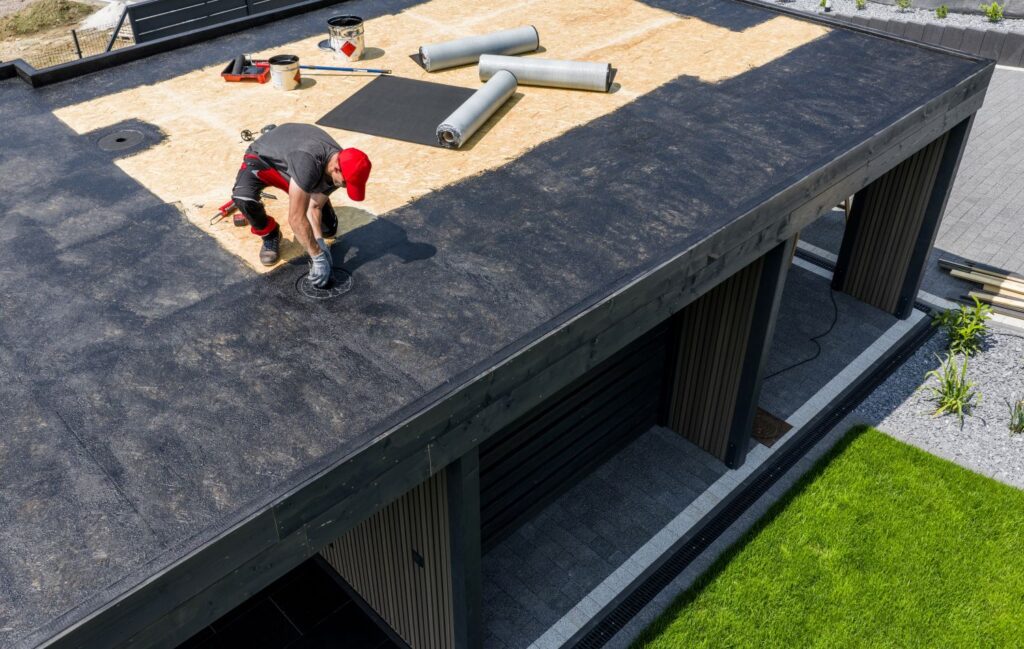
Our Flat Roof System Installation Process
Installing a flat roof requires careful planning, quality materials, and detailed craftsmanship. Here’s what you can expect from our step-by-step approach:
1
Inspection & Consultation
We start by evaluating your current roof structure, checking for issues like water damage, a poor drainage system, or failing insulation. Every roof project begins with a detailed assessment.
2
Material Selection
Choosing the right flat roof materials is crucial. We’ll recommend the best fit—like EPDM roofing, modified bitumen, or single-plymembrane—based on your climate, budget, and performance needs.
3
Preparation & Tear-Off
We remove the existing roofing material, assess the roof deck, and make any needed repairs to ensure a solid foundation.
4
Membrane Application
This is where the waterproof magic happens. Whether it’s a built-up roof (BUR) with alternating layers of bitumen or a synthetic rubber like ethylene propylene diene monomer, we install a watertight roof membrane with reinforced seams.
5
Drainage & Detailing
We install roof drains, edge flashings, and sealing around penetrations to prevent future leaks.
6
Final Inspection
Your roof is only as good as the details. We conduct a thorough post-installation roof inspection and walk you through your warranty and maintenance plan.
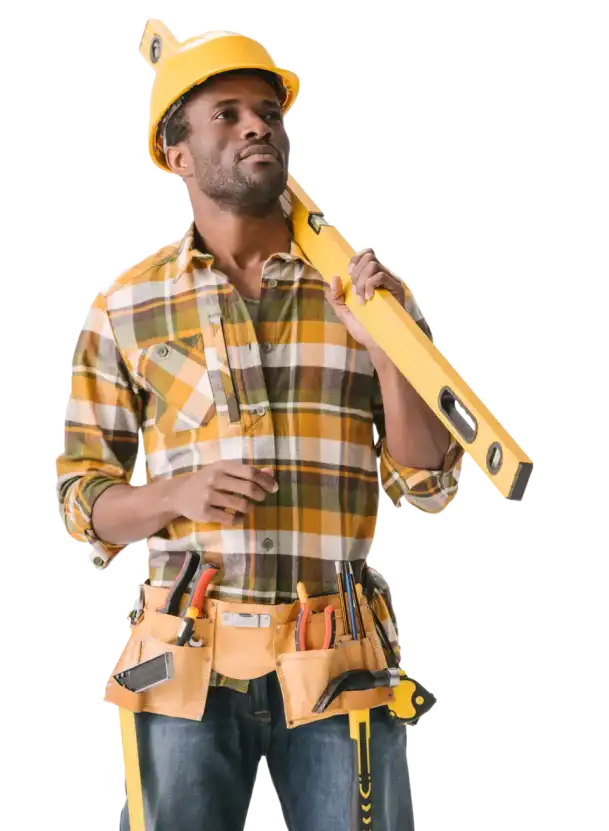
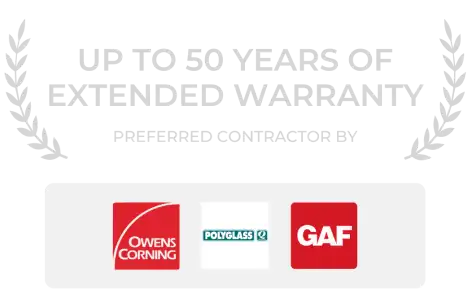
We work with top manufactures ensuring high-quality materials and priority access.
The bottom line? Timely, professional repairs protect both your home and your wallet.
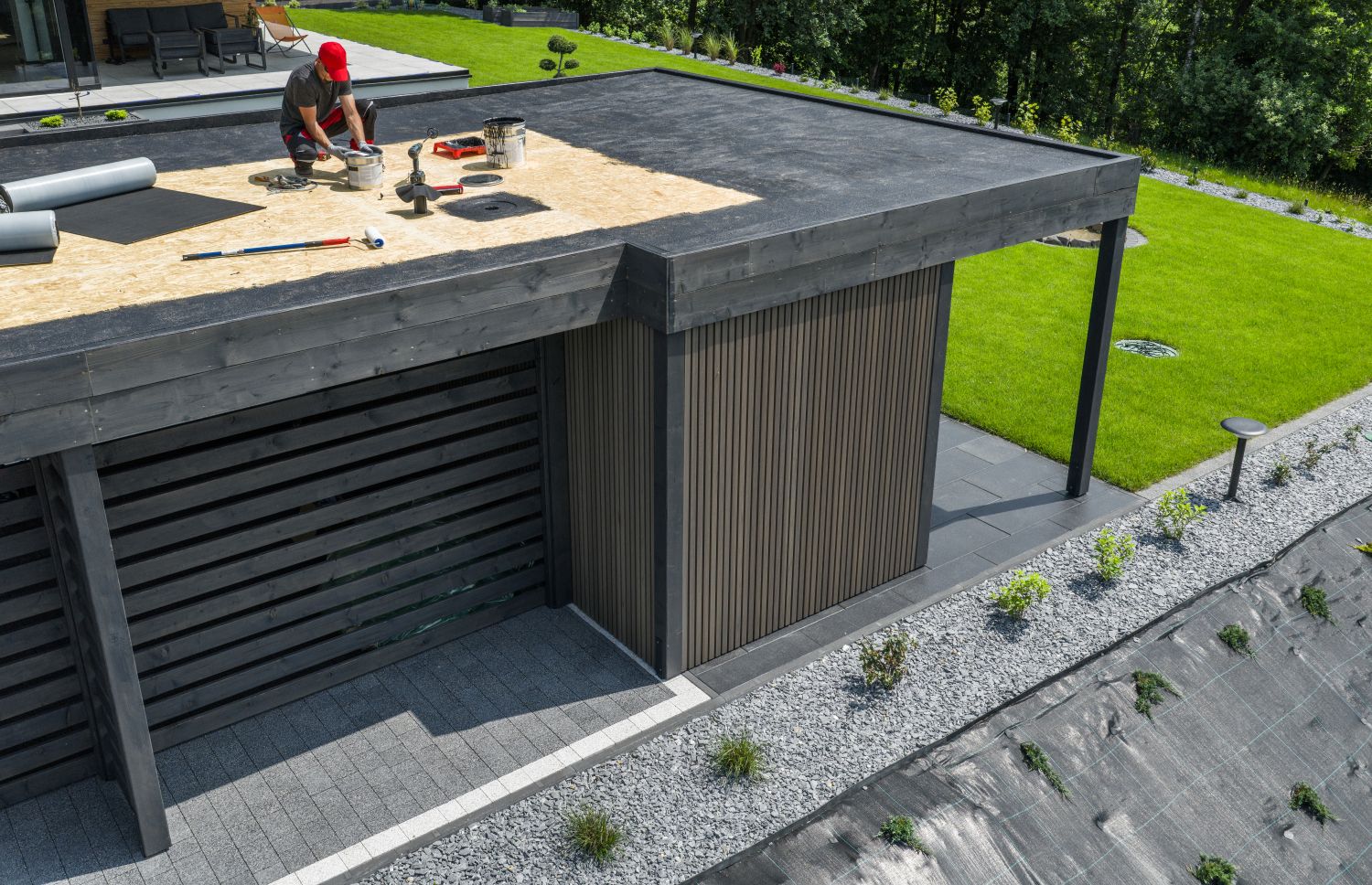
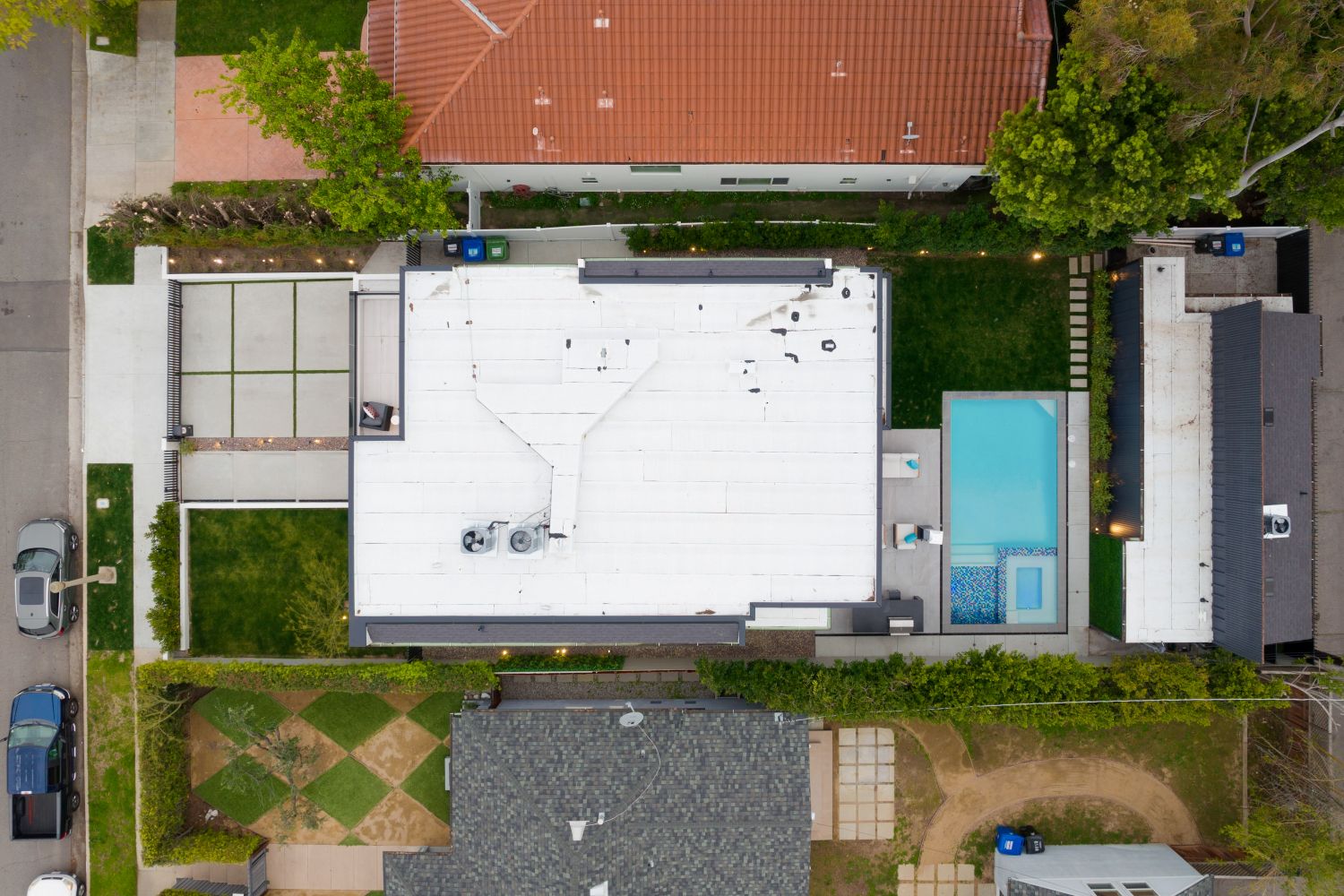
24/7 for prompt, reliable roofing.
Different Types of Flat Roof Materials: What to Know Before You Choose
When comparing different flat roof types, it helps to understand the various kinds of roofing materials available. Let’s break down the most common types:
EPDM (Ethylene Propylene Diene Monomer)
Also known as rubber roofing, EPDM rubber is highly durable and flexible. It resists UV rays, puncture, and foot traffic, making it ideal for both commercial and residential flat roofing applications.
Modified Bitumen
A time-tested solution that combines asphalt with reinforced polyester or fiberglass. A modified bitumen roof offers good roof protection, especially in colder climates. It's applied in rolls and fused with heat or adhesives for a secure fit.
Built-Up Roof (BUR)
BUR systems use alternating layers of bitumen and fabric or felt, finished with gravel or a reflective coating. These roof systems are especially effective for waterproofing and UV protection. They're durable, but heavy, sometimes requiring structural reinforcement.
PVC and TPO (Thermoplastic Polyolefin)
These single-ply roofing systems offer lightweight flexibility and energy efficiency. Thermoplastic roofing systems are known for their cool roof properties, while polyvinyl chloride roofing resists chemical damage and is easy to install.
Green Roofs
For the eco-conscious homeowner, green roofing adds living plants atop a protective waterproof membrane. These systems provide insulation, reduce stormwater runoff, and boost your building's sustainability.
Whatever type of flat roof you’re considering, we help you balance lifespan, climate resistance, and upfront investment.
FAQ: Common Flat Roof Questions, Answered
What is the best material for a flat roof?
The best flat roof material depends on your current roof surface, climate, and budget. EPDM and TPO are great for energy efficiency and flexibility, while built-up roofs (BUR) and modified bitumen excel in durability and waterproofing. Each roofing material has pros and cons, so we help you match the system to your needs.
How long does a flat roof last?
With proper roof maintenance, a well-installed flat roof can last 20 to 30 years or longer. EPDM roofing and PVC membranes typically offer extended lifespans thanks to their UV resistance and flexibility. Lifespan also depends on factors like weather, roof drain efficiency, and foot traffic.
Are flat roofs more prone to leaks?
Flat roofs aren’t actually completely flat, but without proper slope or drainage, they can develop leaks. That’s why using a high-quality membrane and ensuring proper roof construction is key. Regular inspections and a good drainage system will prevent water buildup and prolong roof life.
Can flat roofs support solar panels?
Yes! Flat roof systems are excellent for solar roofing because they allow optimal panel positioning and easy access for maintenance. They can also support energy-efficient roofing systems like cool roofs or even green roofing with added structural reinforcement.
What is a built-up roof (BUR)?
A built-up roof consists of alternating layers of bitumen and reinforcing fabrics, finished with gravel or coating. BURs are known for their excellent waterproofing and are especially effective in commercial settings. They’re heavier than other systems and may require added roof structure support.
How do you maintain a flat roof?
Maintenance involves regular roof inspection, clearing debris, and checking for damage to the membrane roof or flashing. Ensuring your roof drain is unclogged is critical to preventing pooling and leaks. Annual maintenance keeps your roofing system performing at its best.
Is EPDM the same as rubber roofing?
Yes, EPDM (Ethylene Propylene Diene Monomer) is a type of synthetic rubber commonly used in flat roof materials. It’s favored for its flexibility, UV resistance, and ability to handle foot traffic without puncturing easily. EPDM is often used in both residential and commercial flat roofing projects.
Can flat roofs be installed on homes?
Absolutely—residential flat roofing is becoming increasingly popular in modern and minimalist architecture. It offers a sleek look and maximizes usable roof space for rooftop patios, solar panels, or even small gardens. Flat roofs are also easier and safer to access for routine maintenance.
What's the cost of flat roof installation?
Roof costs vary depending on roofing material, labor, and the complexity of the roof project. In general, flat roofs tend to cost less than traditional sloped roofs, but high-end options like PVC or green systems may be pricier upfront. We offer transparent pricing and custom quotes based on your specific needs.
How does drainage work on a flat roof?
While flat roofs may appear level, they’re built with a slight pitch to direct water toward integrated roof drains or scuppers. A well-designed drainage system is essential to avoid water pooling, leaks, and long-term damage. Our team ensures every roof installation includes proper water management features.
Contact With Us
Send us a message, and we’ll respond promptly.
Ready to Upgrade? Let's Build the Flat Roof You Need
- Fully licensed and insured roofing business
- Enrolled in GAF certification programs
- Experts in residential, commercial, and specialty systems
+1 805-225-7663
Our Values
Our values guide everything we do. We prioritize integrity, excellence, and customer satisfaction in every roofing project. With a commitment to quality craftsmanship and fair pricing, we ensure your trust and satisfaction. Our goal is to be your reliable partner in achieving the best roofing solutions tailored to your needs.
